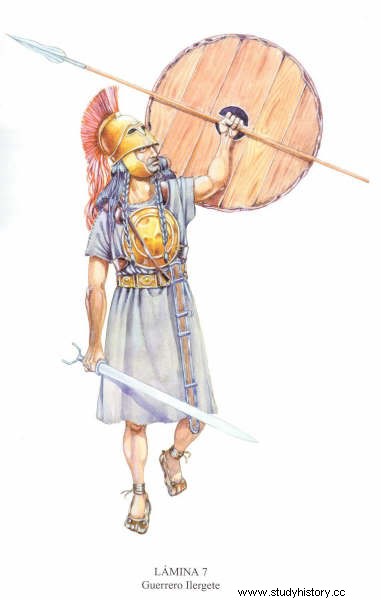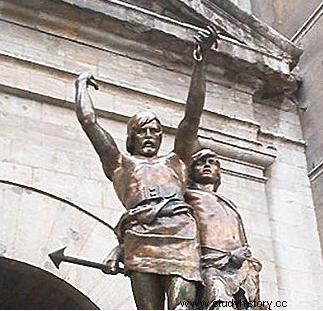Our archenemy of today is one of those heroes of other times, a symbol along with Numancia or Sagunto of the pride we felt for Hispanic stubbornness. The stubbornness of Indibil , together with that of another indigenous régulo called Mandonio , was part of the syllabus in schools to encourage the national spirit...
Twenty-fifth installment of “Archienemies of Rome “. Collaboration of Gabriel Castelló
But... Who was really Indibile ? It is not known with certainty who his parents were, but where he was from. According to Roman historians, Indíbil was the ruler of the ilergetes , so we could place his birth around 258 B.C. in the city of Ilerda or contoured (current Lleida) It is Tito Livio who speaks of him as Indíbilis , while the Greek Polybius , the chronicler of Scipio Emiliano, calls him Andóbales . Both the names Indi as Ando , as well as the suffix –beles , are clearly Iberian, a contingency that questions the theory of a possible Celtic origin of this leathery individual.
And who were the ilergetes ? It was the Iberian ethnic group that occupied a large part of the current provinces of Lleida and Huesca. Ancient historians spoke of a city called Atanagrum as its capital, but its exact location is still unknown. The great city of the Ilergetes was Ilerda , perhaps the most important Iberian population north of Arse (Sagunto) Its strategic position between the middle valley of the Ebro and the sea, as well as the agricultural and livestock resources of the territory, caused the two great roosters that rose in the Mare Internum covet their resources.

ilergete warrior
This is where Indibile comes in. in the history. We know very little about his appearance and character, since there are no physical or psychological descriptions of the character, but we do know how he moved from alliances with the Carthaginians and Romans trying to keep their lands out of the bloody dispute between the two powers. His search for a beneficial balance caused him to shift allegiances as the winds blew. Today we would consider such conduct dishonorable, but for the Iberian and Celtiberian society of the time it was completely normal to change their minds and sides in the middle of the conflict. Cases like this, and worse, happened a few years later in the Viriato war. , the Numantine siege or during the revolt of Quintus Sertorio .
The fact is that, perhaps before or as a result of the taking of Sagunto, a clear example of the passivity of the Roman Senate in the face of an attack on an allied city, Indibile chose to support the Punics. His pact with Carthage forced him to place himself under the command of Hanno , the Punic commander Hannibal Barca left to control Hispania while he undertook his legendary Italian campaign. What Indíbil did not calculate was that the war between Rome and Carthage would spread to Hispania so soon, and less than a military expert, Gneo Cornelio Escipión , recently landed at Emporion (Ampurias, Girona), battled Hannón at the head of his two legions and defeated him against Cissa , a place very close to present-day Tarragona. The Punic setback was considerable:six thousand killed and two thousand captured, including Hanno himself and Indíbil. Asdrubal Barca , who arrived late to the battle with his reinforcements, could only harass the Roman fleet and maintain the Ebro as a natural boundary between the two powers.
The release of Indibile it involved the delivery of tributes and ilergetes hostages to Rome, being expelled from a good part of the territories that it had ruled until then. The following year he resumed his pro-Punic operations harassing various Celtiberian tribes related to the interests of Rome. His renewed alliance with Hasdrubal gave him free rein to expand his power among other less warlike neighboring Regulus, and more so after the defeat and death of the two Scipios at Kastulo and Ilorci (upper Guadalquivir, Jaen). Carthaginian friendship was not gratuitous for the ilergete oligarch. He had to hand over a good amount of silver and his own wife as a hostage. Perhaps tired of the infinite greed of Barca, or perhaps attentive to the change of winds that was taking place in Hispania, in 209 B.C. Indibile agreed with Publius Cornelius Scipio , son of one of the Scipios and a new legate sent by the Senate of Rome to tackle the Punic problem. The Roman brought together under his command many Iberians dazzled by his good fortune, something that might have led Indíbil to change loyalties. The ilergete help would come in exchange for the return of the hostages that were still in Hasdrubal's hands and the confirmation of his status as a vassal king of the Republic once Carthage was expelled from Iberia.

Indibil and Mandonio
The causes are not known with certainty, it may be that the Iberians saw that Rome was a lion dressed as a lamb, or perhaps the Barcid agents bribed the indigenous régulos, but the fact is that only one year he kept his new pact of fidelity to Rome, So in 208 B.C. again Indibile he forms alongside the Iberian allies in the ranks of Asdrúbal. The battle of Baécula (perhaps in Santo Tomé, Jaén) was settled like that of Cissa for the interests of Carthage. Asdrúbal managed to flee, the Punics were defeated, Indíbil was once again captured and released in exchange for large tributes.
The third was not the winner. The following year Indíbil supported a new Hispanic revolt against Rome promoted by the Carthaginian Magón . Another Iberian régulo, Mandonio of the Ausetans , who was perhaps his brother-in-law, also attended the battle that took place in 206 BC. and that meant the definitive consolidation of Rome in the peninsula. Scipio and his faithful Gaius Lelio They massacred 20,000 insurgents in a narrow, indeterminate valley in Sedetania . Indibile and Mandonio they managed to escape.
The departure of Scipio to Africa gave new wings to the stubbornness of the régulo ilergete. Again the malcontents rose against Rome, and again they were defeated, but Lug's mantle did not cover him on that occasion:Indibile fell in combat and Mandonio he was handed over to the Romans as part of their unconditional surrender, and was executed shortly after.

Death of Indíbil
This was the death of Indíbil according to Livy Titus :
Once those who were fighting around the king fell, riddled with darts, who stood half dead and then was pinned to the ground by a javelin
